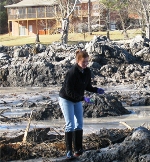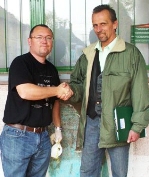The Electric Power Research Institute compared the energy use of frozen food cooking in microwaves, toaster ovens, and conventional ovens.
According to a Mexico government and Pew Center survey of more than 500 COP16 attendees, action against climate change requires the support of the public, whose members may not even understand the problem.

The experts answer why the topic is so hot now and the best way you can protect your clients and yourself from liability.
United Science, a Minnesota startup company, has licensed sensor technology developed at the University of Minnesota that could limit the amount of toxic byproducts from mining and other industries that end up in the environment and improve productivity at the same time.

Current water quality monitoring looks only at the surface, according to Avner Vengosh, Duke professor of geochemistry and water quality.
Preliminary emissions testing of a small-scale waste-oil power generator have found that the system generates low emissions.

Many coastal wetlands worldwide — including several on the U.S. Atlantic coast — may be more sensitive than previously thought to sea-level rise projections for the 21st century, according to the U.S. Geological Survey.
One new final toxicological profile for chlorine and six updated ones of priority hazardous substances are in this new set.
Passage of the Diesel Emissions Reduction Act is being supported by more than 500 environmental, health, industry and government organizations, according to the Diesel Technology Forum.
North Carolina's LID certification program, which will be discussed in the webcast, may be replicated nationally.
MiaSolé, which manufactures copper indium gallium selenide (CIGS) thin-film photovoltaic solar panels, announced that the U.S. Department of Energy's National Renewable Energy Laboratory (NREL) independently confirmed the 15.7 percent efficiency of its large-area production modules, which are one square meter in size.
Deforestation rates in the Brazilian Amazon declined 14 percent from August 2009 to July 2010, reaching the lowest rates ever recorded for the second consecutive year.
Coal-tar-based pavement sealant is the largest source of polycyclic aromatic hydrocarbons found in 40 urban lakes the U.S. Geological Survey studied, according to the agency.

Site inspections and company documentation revealed that Beazer Homes allegedly failed to obtain stormwater permits or, if the company did get them, it did so after construction began.

Hawaii-based company travels to Hungarian village to help clean up caustic alkali and plans to return to teach residents how to use DeconGel.
The Salt River Materials Group’s Phoenix Cement Company Plant in Clarkdale, Ariz., achieved a perfect efficiency record for the third straight year.
International Paper and Mississippi River Pulp turn Starbucks Coffee cups into fiber suitable for use in new cups.
The contracts, valued up to $40 million and $119 million, respectively, are designed to help Indonesia reduce threats to deforestation and to assist Kabul in improving delivery of public services such as sanitation and solid waste
In April 2011, Lufthansa will begin a six-month trial with an Airbus A321 engine that will use a 50-50 mix of biofuel and traditional kerosene.